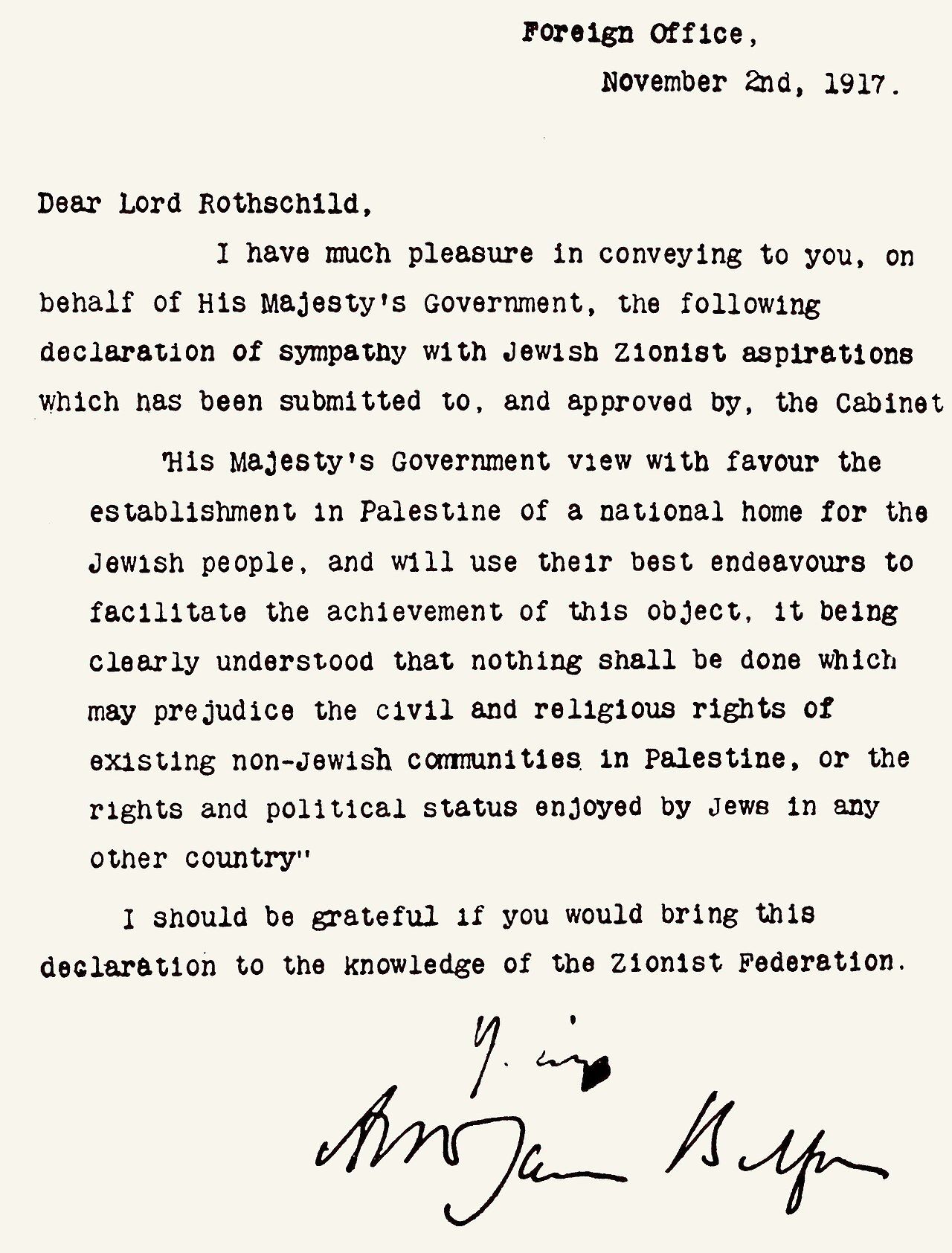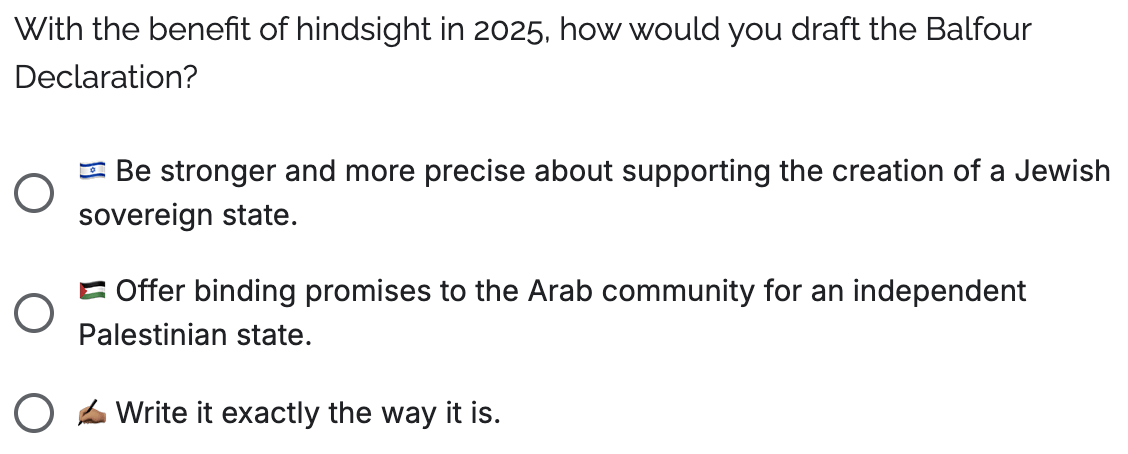- Signpost
- Posts
- 📜 Introducing 'Texts That Shaped The World'
📜 Introducing 'Texts That Shaped The World'
A new series analysing texts that have had a lasting impact on the 21st century

What they said, what it means, and why it matters.
Hi Signposter. A few days ago I tried to understand why the Israel-Palestine conflict has become (or perhaps has always been) such an intractable conflict with no end in sight. Today, two opposing narratives are fighting for relevance. One is from high profile right wing Israeli politicians who are calling for Israel’s occupation of Gaza, seemingly removing any chance of a Palestinian state being recognised. The other is from core Israel allies France, the U.K., Canada, and now Australia who insist they will recognise a Palestinian state next month at the UN if the current situation in the region does not change.
The coverage of the news remains clearly in the present, but can we find a potential starting point in history that led to where we are today?
With that in mind, this is the first issue of a new series on Signpost called ‘Texts That Shaped The World’, where I’ll analyse the language used in documents from history that have a lasting and outsized impact on 21st century society.
First up, the Balfour Declaration — or how a 67-word sentence set the stage for one of the world’s longest running, most violent conflicts.
TEXTS THAT SHAPED THE WORLD #1
🇬🇧 Balfour Declaration - 1917
Here is the entire text of the declaration, verbatim, from The Rothschild Archive, with specific words and phrases highlighted for semiotic analysis below:
Foreign Office,
November 2nd, 1917.
Dear Lord Rothschild,
I have much pleasure in conveying to you, on behalf of His Majesty's Government, the following declaration of sympathy with Jewish Zionist aspirations which has been submitted to, and approved by, the Cabinet:
"His Majesty's Government view with favour the establishment in Palestine of a national home for the Jewish people, and will use their best endeavours to facilitate the achievement of this object, it being clearly understood that nothing shall be done which may prejudice the civil and religious rights of existing non-Jewish communities in Palestine, or the rights and political status enjoyed by Jews in any other country".
I should be grateful if you would bring this declaration to the knowledge of the Zionist Federation.
Yours sincerely
Arthur James Balfour
HISTORICAL CONTEXT
1️⃣ What was happening?
The declaration was delivered right in the middle of what is classified as World War I (1914-1918). The main focus of such a public declaration by a major power (Britain) towards Zionism and the establishment of a Jewish state was primarily to gather support from the Jewish community, both within and without Britain, who would provide political and financial support for the increasingly expensive war effort.
Similarly, the hope was that increased support from the Jewish community would encourage the United States (and Russia) to fully engage in the war on the side of Britain.
At the time, the Palestinian region had been under the control of the increasingly weakened Ottoman Empire for 400 years, with a majority Arab (Muslim and Christian) and minority Jewish population.
However, Britain had already made other arrangements and promises with other parties regarding Palestine:
The first was with the Muslim Sharif of Mecca (McMahon–Hussein correspondence from 1915 to 1916), where Britain promised support for an independent Arab state (that Arabs believed included Palestine) from the Ottoman Empire only if the Arabs revolted against the Ottomans.
The other (secret) agreement was made with France (Sykes–Picot Agreement in 1916), where both countries agreed to split the Arab region under British and French control, with Palestine in British control under ‘international administration’.
2️⃣ Who wrote this and to whom?
The author of the declaration was Arthur James Balfour, the British foreign secretary at the time who had also served as British prime minister from 1902 to 1905. The recipient of the declaration was Walter Rothschild, a British banker, politician, member of the historically wealthy Rothschild family, and a prominent Zionist leader of the British Jewish community.
ANALYSING THE TEXT
Words / Phrases | What it Says | What it Means |
|---|---|---|
His Majesty's Government | The government of King George V | This statement has the official backing of the government of Great Britain with the blessing of the king. |
declaration of sympathy | Officially declare Britain’s support | A non-legal, non-binding, indication of the emotional state of a nation |
Jewish Zionist aspirations | Ambitions of a homeland for the Jewish community | Committed to facilitating a Jewish state |
view with favour | Agree with and approve of | Agree with in a non-legal, non-binding way |
in Palestine | within Palestine | inside an undefined geo-political area that has a minority Jewish population, does not have universally agreed upon borders, and is currently under the administration of an enemy (Ottoman) empire, without any input from Palestinians |
national home for the Jewish people | A Zionist land | Not a sovereign state |
their best endeavours to facilitate the achievement | We will do everything we can | We will do what we reasonably can to support this but not lead on this |
may prejudice | May impact | May impact (subject to interpretation) |
the civil and religious rights | The rights to exist and worship freely | Not legal or political rights |
the rights and political status | The human and political rights | The human and political rights |
IMPLICATIONS
1️⃣ What happened next?
Both Arabs and Jews reacted differently to the news. It being the first public declaration for Zionism by a major global power, Zionists rallied around the mandate and worked hard to engage support from the global Jewish community towards a legitimate Jewish state.
Meanwhile, the local Arab Muslim and Christian populations of Palestine vehemently opposed the declaration, with the wider Arab Muslim community specifically classifying the declaration as a betrayal by the British, violating previous agreements.
After World War I, the League of Nations awarded Britain the complete control of Palestine, holding them accountable to ‘facilitate’ a ‘national home for the Jewish people’. This led to inter-communal conflict in the region, leading to further escalations in violence between the fast growing Jewish migrant and existing local Arab communities in Palestine. Britain’s regulations were initially pro-Jewish, then pro-Arab, with neither community fully satisfied.
Finally, in 1948, in a post World War II and Holocaust world, with increasing support for a Jewish state, Britain, unable to reconcile the situation, handed the issue over to the newly formed United Nations, extricating themselves from the region without providing a permanent solution.
2️⃣ What’s happening now?
When politicians and experts bandy about a ‘two state solution’, they are referencing this document.
Israel and Palestine have since been embroiled in several wars with moments of fragile peace scattered in between. The current combination of two separate governments governing the Palestinian territories of Gaza (Hamas - backed by Iran) and the West Bank (Fatah - backed by the Gulf Arab states) has meant that Israel has managed to build more settlements in the West Bank that are illegal according to international law. Despite this, after several decades of no recognition by Arab Muslim countries, Israel now shares full diplomatic relationships with Sudan, Egypt, Jordan, Bahrain, Morocco, and the United Arab Emirates.
Should the grapevine be believed, one of the current (and several previous) U.S. president’s big goals is to have Saudi Arabia, arguably the richest and most politically important Arab Muslim country in the world, normalise relations with Israel. This is despite most Gulf countries engaging with Israel behind closed doors on security issues against Iran.
Meanwhile, Israel has declared their intention to occupy Gaza following the Hamas attacks on Israel on 7th October 2023. France, the United Kingdom, Canada, and Australia have announced their intention to recognise the State of Palestine (joining another 147 others as of writing) come September if the current humanitarian situation in Gaza and the West Bank does not change.
WHAT WOULD YOU DO?
Indulge me for this next section: you are Arthur James Balfour and you are working on the Balfour Declaration. You are looking to increase support for British war efforts by engaging the influential and wealthy Jewish community within Britain and internationally. One effective way for you to do so is to publicly support the creation of a Jewish state in the Palestinian region.
At the same time, Britain has already promised an independent Palestinian state to the Arab community in exchange for them to revolt against the Ottoman Empire, which is also crucial to British military success.
Tell me your reasoning. In next week’s issue, I’ll highlight the most thought-provoking responses.
NEXT WEEK ON SIGNPOST
It’s August, and a glut of independence and national days abound in Southeast Asia and South Asia. In the spirit of the recent celebration of Singapore’s 60th National Day, we’ll analyse the Proclamation of Singapore — the two page document that declared Singapore’s separation from Malaysia back in 1965.
Was this forwarded to you? Signpost is a free weekly newsletter analysing historical declarations and modern opinion pieces, what they mean, and why they matter. It’s free to subscribe. Think somebody else would enjoy this? Send them here.


